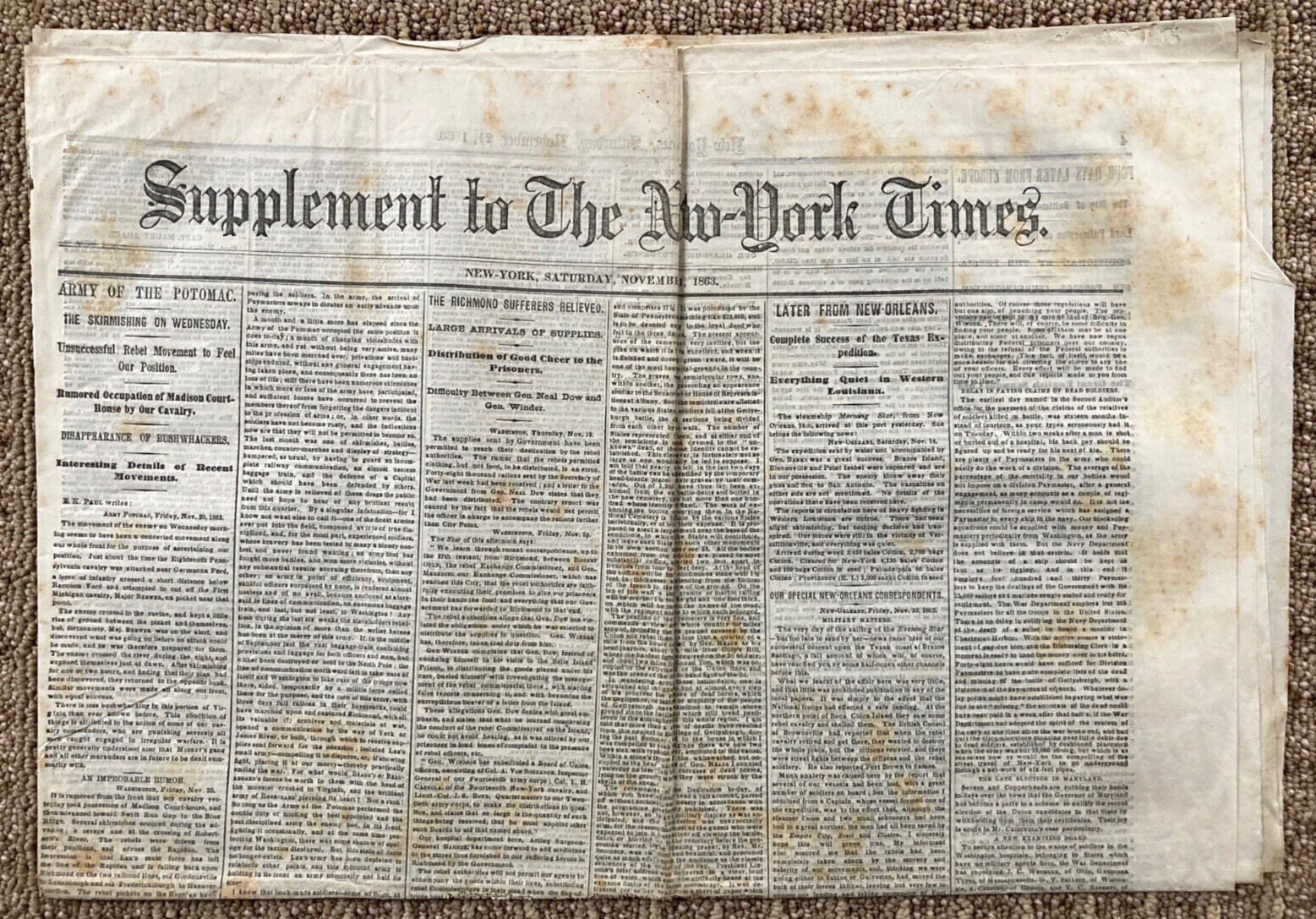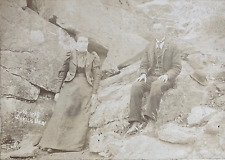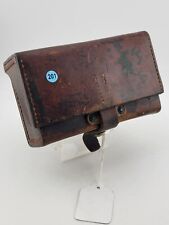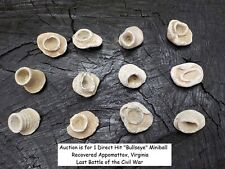RARE CIVIL WAR NEW YORK TIMES SUPPLEMENT NOV 21, 1863 LINCOLN at GETTYSBURG For Sale

When you click on links to various merchants on this site and make a purchase, this can result in this site earning a commission. Affiliate programs and affiliations include, but are not limited to, the eBay Partner Network.
RARE CIVIL WAR NEW YORK TIMES SUPPLEMENT NOV 21, 1863 LINCOLN at GETTYSBURG:
$265.00
CIVIL WAR NEWSPAPER NEW YORK TIMESSUPPLEMENT NOV 21, 1863 GETTYSBURG ADDRESS CELEBTRATIONVERY RARE! CIVIL WAR SUPPLEMENT to theNEW YORK TIMES DATED NOV 21, 1863. LINCOLN GIVES GETTYSBURG ADDRESS OF NOV 19,1863 .
CONTAINS THE FRONT PAGE ARTICLE ON PRESIDENT LINCOLN'S VISIT TO GETTYSBURG PENNSYLVANIA TO DELIVER THEGETTYSBURG ADDRESS AT THE MULTI DAY CELEBRATION DATED NOV 19,1863.
FRONT PAGE ARTICLE BY A NEW YORK TIMES SPECIAL CORRESPONDENT ONNOV 19,1863 (THE DATE THE GETTYSBURG ADDRESS WAS GIVEN)GIVING HIS EYE / EAR WITNESS ACCOUNT OF THE PRESIDENT GIVING THE SPEECH AND LINCOLN'S MOVEMENTS AND ACTIVITIES OF HIS VISIT. INCLUDING MANY OTHER FACTS FROM THE CELEBRATION.
TheGettysburg Addressis a speech that U.S. President Abraham Lincoln delivered during the American Civil War at the dedication of the Soldiers' National Cemetery, now known as Gettysburg National Cemetery, in Gettysburg, Pennsylvania on the afternoon of November 19, 1863, four and a half months after the Union armies defeated Confederate forces in the Battle of Gettysburg, the Civil War's deadliest battle. It remains one of the best known speeches in Americanhistory.
ALSO INCLUDES MANY OF THE CURRENT, NEWS OF THE WAR.
CONDITION IS VERY FINE THROUGHOUT WITH A FEW VERY MINOR WEAR SPOTS AND SOME LIGHT FOXING.
THIS IS AN UNTRIMMED 8 PAGE FOLIO.
THIS IS A RARELY SEEN NEWSPAPER THAT IS NOT FROM A LIBRARY BOUND EDITION.
APPROXIMATE DIMENSIONS : 15 3/4" x 22 SOFT FOLDED TO 11" x 15 3/4"
(please see pictures)
====================
THE GETTYSBURG CELEBRATION.
From our Special Correspondent
GETTYSBURG, Penn., Thursday Evening, Nov. 19, 1863.
All the noteworthy incidents of the celebration here to-day have already been sent off to you by telegraph, and it would have gratified your correspondent exceedingly if he could also have got off, but fate, combined with the miserable railroad arrangements, has ordained that he should spend another night in this over-crowded village. The only train that has been permitted to leave here, to-day, was the special train bearing the President and his party, which left at 6 o'clock this evening. Even the mail train, which should have left at 8 o'clock this morning, was detained for fear it would come in collision with some of the numerous trains that have been following each other in rapid succession from Hanover Junction, bringing visitors to the Dedication. How they are all to sleep here to-night it is difficult to imagine. All the hotels as well as the private houses were filled to overflowing last night. Every housekeeper in Gettysburgh has opened a temporary hotel, and extends unbounded hospitality to strangers -- for a consideration. People from all parts of the country seem to have taken this opportunity to pay a visit to the battle-fields which are hereafter to make the name of Gettysburg immortal. The Dedication ceremonies were apparently a minor consideration, for even while Mr. EVERETT was delivering his splendid oration, there were as many people wandering about the fields, made memorable by the fierce struggles of July, as stood around the stand listening to his eloquent periods. They seem to have considered, with President LINCOLN, that it was not what was said here, but what was done here, that deserved their attention. During the last three days, the scenes of the late battles have been visited by thousands of persons from every loyal State in the Union, and there is probably not a foot of the grounds that has not been trodden over and over again by reverential feet. But little over four months have passed away since the champions of Slavery and Freedom met here in deadly strife, and already the name of Gettysburg has become historical, and its soil is classic ground. This, too, while the contest is yet undecided, and the camp-fires of the contending armies still illumine the Southern sky. If the people of the North can thus forestall history, it is because the manifest justice of their cause enables them to see the future in the present, and to behold in the fresh made graves of their fallen sons the shining monuments of their glory in ages to come.
The National Cemetery which has been consecrated to-day by such imposing ceremonies is located in the very midst of the fierce strife of those terrible July days, and many of the Union heroes fell on the ground comprised within its inclosure. It is little over half a mile to the south of the Gettysburg Court-house, in the outskirts of the town, on what is called Prospect Hill, which is but a continuation of the elevated ridge known as Cemetery Hill. This hill, it will be recollected, formed the northernmost line of the Union armies during the last two days of the battle, and was several times stormed by the rebel infantry without success. The new cemetery is contiguous to the town cemetery of Gettysburg and comprises 17 1/4 acres. It was purchased by the State of Pennsylvania at something like $25,000, and is to be devoted exclusively to the loyal dead who fell in the three days' battles. The present appearance of the cemetery is not very inviting, but the plan on which it is laid out is excellent, and when it is finished and covered with green sward, it will be one of the most beautiful burial-grounds in the country. The graves will form semicircular rows, one within another, the whole presenting an appearance similar to the Senate Chamber or House of Representatives at Albany. Sections of the semicircle are allotted to the various States whose soldiers fell at the Gettysburg battle, the different sections being divided from each other by a foot-walk. The number of States represented is eighteen, and at either end of the semicircle is a section devoted to the "unknown" dead, or those whose identity cannot be established. This class, however, is fortunately not so large as one would naturally be led to suppose. I am told that nearly all who fell in the last two days of the battle can be easily identified by the temporary head-boards placed ever their graves by their comrades. Out of 1,300 who have thus far been exhumed from the various battle-fields and buried in the new cemetery, there are not more than one hundred whose identity is not used. The work of exhuming the bodies and reburying them in the National Cemetery is to be done by the various States individually, or at least at their expense. It is proposed to erect a large monument near the base of the semicircle, to which all the States will contribute, and leave each State to erect such other monuments in its own section as it may see fit. All the bodies exhumed from the battle-fields are placed in most substantial coffins, and buried two feet apart in trenches from four to five feet deep. At the head of the coffins will be built a continuous stone wall 1 1/2 feet in thickness and extending from the bottom of the trench to the surface of the ground. On the top of this wall a smooth granite or marble railing will be erected 1 1/2 feet in height and one foot thick, on which will be inscribed the names of the dead, with the regiment and State to which each belonged.
The position of the new cemetery is very fine, and commands a view of the whole country for miles around, including the entire ground covered by the Union and rebel lines. It is less than a quarter of a mile from the house occupied by Gen. MEADE as his headquarters, about half a mile from Culp's Hill, where the hardest fighting occurred on the 3d of July, and about two miles from Round Top, which was occupied by the extreme left of the Union lines, and was the scene of the hand-to-hand fight of the 2d.
In wandering around these battle-fields, one is astonished and indignant to find at almost every step of his progress the carcases of dead horses, which the negligence, or laziness or stupidity of the people of Gettysburg have permitted to remain above ground since the battle, and which still breed pestilence in the atmosphere of this whole region. I am told that more than a score of deaths have resulted from this neglect in the village of Gettysburg, during the past Summer; and in the house in which I was compelled to seek lodgings there are now two boys sick with typhoid fever, attributed to this cause. Within a stone's throw of the whitewashed hut occupied as the headquarters of Gen. MEADE I counted yesterday no less than ten carcases of dead horses, lying on the ground where they were struck by the shells of the enemy.
The ceremonies of the Dedication to-day, of which you have already read a full account, passed off without accident, and nearly in accordance with the programme previously published. There was not, however, so large a military display as was anticipated, and the procession was unexpectedly slim, for the reason that most of the guests who were expected to join it were either off viewing the battle-fields, or hurried up to the cemetery before the procession started. The opening prayer, by Rev. Mr. STOCKTON, was touching and beautiful, and produced quite as much effect upon the audience as the classic sentences of the orator of the day. President LINCOLN's brief address was delivered in a clear, loud tone of voice, which could be distinctly heard at the extreme limits of the large assemblage. It was delivered (or rather read from a sheet of paper which the speaker held in his hand) in a very deliberate manner, with strong emphasis, and with a most business-like air. Previous to the President's address, the following ode, by Maj. B.B. FRENCH, was sung by a vocal Club from Philadelphia, in [???] of a dirge by J.C. PERCIVAL, which was to have been sung:
'Tis holy ground --
This spot, where, in their graves,
We place our country's braves,
Who tell in Breed[???]'s holy cause
Fighting for Liberty and Laws --
Let tears abound.
Hero let them [???]t --
And Summer's heat and Winter's cold,
Shall glow and freeze above this mold --
A thousand years shall pass away --
A nation shall still mourn this clay,
Which now is blest.
Here, where they fell,
Oft shall the widow's tear be shed,
Oft shall fond parents mourn their dead,
The orphan here shall kneel and weep,
And maidens, where their lovers sleep,
Their woes shall tell.
Great God in Heaven!
Shall all this sacred blood be shed --
Shall we thus mourn our glorious dead;
Oh, shall the end be wrath and woe,
The knell of Freedom's overthrow --
A country riven?
It will not be!
We trust, oh God! Thy gracious power
To aid us in our darkest hour.
This be our prayer: "Oh Father! save
A people's freedom from its grave --
All praise to Thee!"
After the dedication ceremonies were over, the President returned to the residence of Mr. WILLS, whose guest he has been since he arrived here, and from thence walked to the church on Baltimore-street, to listen to an oration by Lieut.-Gov. ANDERSON, of Ohio. He walked up to the church arm in arm with the famous TOM BURNS, the only man in Gettysburg who had patriotism or pluck enough to take a gun on his shoulder and help the Union army defend his town.
Soon after the arrival of the President at Gettysburg last evening, he was serenaded by a Baltimore band, and after numerous calls for "the President," "Old ABE," "Uncle ABE," "Father ABRAHAM," "the next President," &c., &c., was induced to make his appearance at the door. He said he was fired, and old not feel like speaking, and as a man who did not feel like talking was apt to say foolish things, he begged to be excused from making a speech. The audience cheered the sentiment, and the President, taking it for granted he was excused, retired to his room. The crowd then called on Secretary SEWARD, who was stopping near by with Mr. HARPER, editor of a paper printed here, and were more successful. After two or three airs by the band, mingled in the calls for the Secretary, Mr. SEWARD made his appearance, and spoke as follows:
MR. SEWARD'S SPEECH.
FELLOW-CITIZENS: I am now sixty years old and upward; I have been in public life practically forty years of that time, and yet this is the first time that ever any people or community so near to the borders of Maryland was found willing to listen to my voice; and the reason was that I said forty years ago that Slavery was opening before this people a grave-yard that was to be filled with brothers falling in mutual political combat. I knew that the cause that was hurrying the Union into this dreadful strife was Slavery, and when I did elevate my voice it was to warn the people to remove that cause when they could by constitutional means, and so avert the catastrophe of civil war that now unhappily has fallen upon the nation, deluging it in blood. That crisis came, and we see the result. I am thankful that you are willing to hear me at last. I thank my God that I believe this strife is going to end in the removal of that evil which ought to have been removed by peaceful means and deliberate councils. [Good.] I thank my God for the hope that this is the last fratricidal war which will fall upon the country -- a country vouchsafed by Heaven -- the richest, the broadest, the most beautiful, most magnificent and capacious ever yet bestowed upon a people, that has ever been given to any part of the human race. [Applause.] And I thank God for the hope that when that cause is removed, simply by the operation of abolishing it, as the origin of the great treason that is without justification and without parallel, we shall thenceforth be united, be only one country, having only one hope, one ambition and one destiny. [Applause.] Then we shall know that we are not enemies, but that we are friends and brothers, that that this Union is a reality, and we shall mourn together for the evil wrought by this rebellion. We are now near the graves of the misguided, whom we have consigned to their last resting place with pity for their errors and with the same heartful of grief with which we mourn over the brother by whose hand, raised in defence of his Government, that misguided brother perished. When we part to-morrow night, let us remember that we owe it to our country and to mankind that this war shall have for its conclusion the establishing of the principle of Democratic Government -- the simple principle that whatever party, whatever portion of the Union prevails by constitutional suffrage in an election, that party is to be respected and maintained in power until it shall give place, on another trial and another verdict, to a different portion of the people, [Good.] If you do not do that, you are drifting at once and irresistibly to the very verge of the destruction of your Government. But with that principle this Government of ours -- the freest, the best, the wisest and the happiest in the world -- must be, and, so far as we are concerned practically will be, immortal. [Applause.]
PLEASE SEE MY 100% POSITIVE response AND BUY WITH CONFIDENCE

Related Items:
RARE CIVIL WAR VISITORS of THE BATTLE of GETTYSBURG "DEVIL'S DEN" PHOTO 1895
$100.00
Antique Super Rare Civil War Era gun Cleaning Case Stamped "I9 / I / No. 157".
$449.99
Old Rare Vintage Civil War Miniball Direct Hit Recovered in Appomattox Virginia
$20.00



